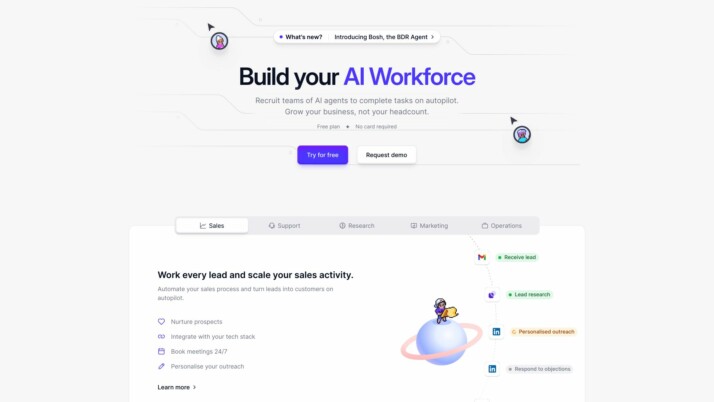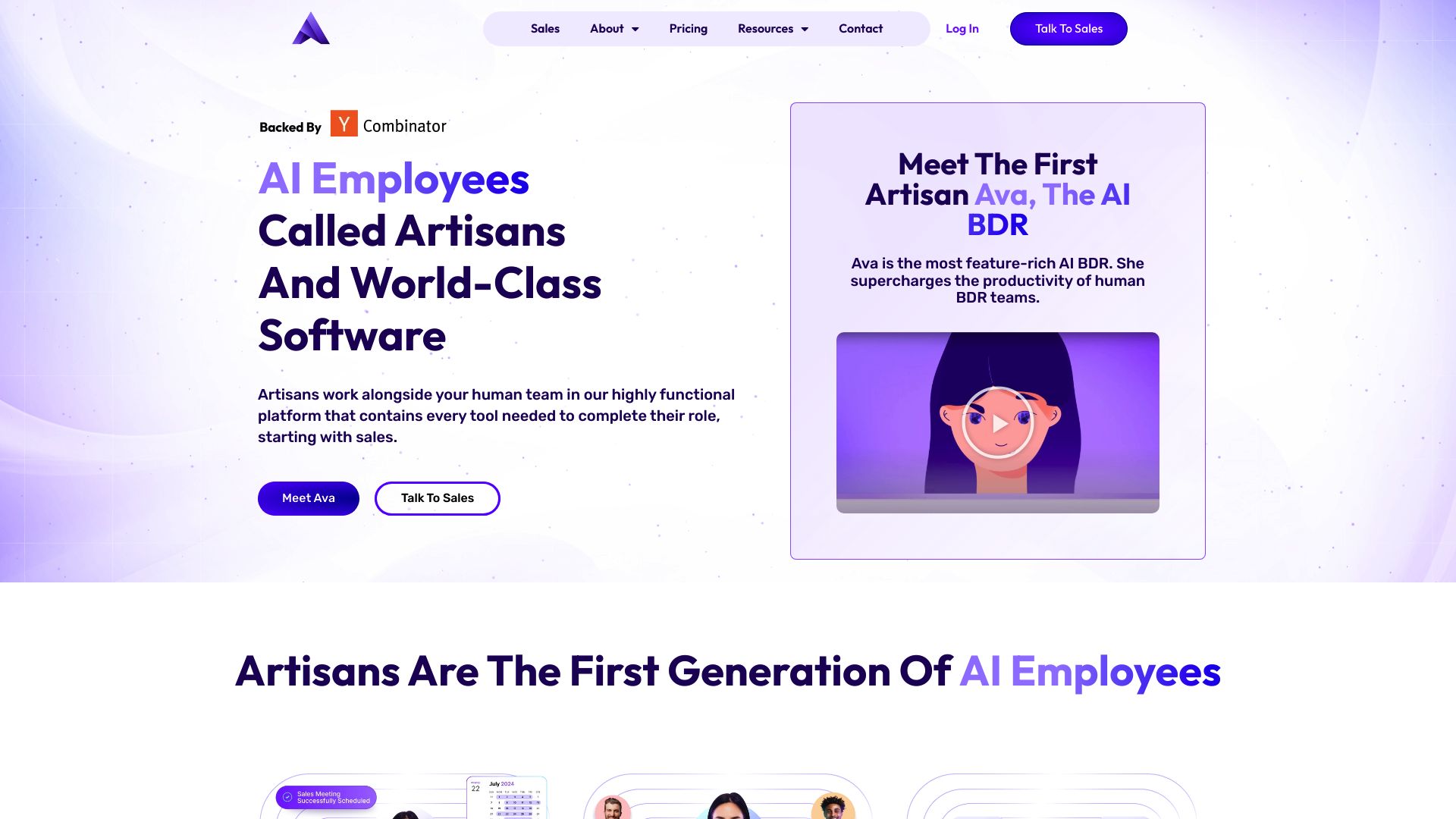AI-powered automation tools have become indispensable for businesses seeking to streamline operations and boost productivity. This review compares three leading platforms: Relevance AI vs. Artisan AI, and SmythOS. Relevance AI offers a low-code environment for building custom AI agents, while Artisan AI provides pre-built digital workers for sales and marketing tasks. SmythOS emerges as a comprehensive solution, combining user-friendly design with advanced customization options. We’ll explore each platform’s unique features, deployment options, and integration capabilities to help you determine the best fit for your organization’s AI needs. Whether you’re a developer, business leader, or non-technical professional, this comparison will equip you with the insights to make an informed decision about implementing AI in your workflow.
Relevance AI Overview
Relevance AI empowers users to build and deploy AI agents without extensive coding. The platform combines low-code tools with advanced AI capabilities, enabling rapid development of intelligent solutions for various business needs.
Relevance AI offers a comprehensive suite of features for creating customizable AI agents. Users can leverage visual builders, pre-built templates, and integrations with popular AI models to construct agents tailored to specific tasks. The platform supports both development and production environments, allowing for seamless testing and deployment.
Relevance AI empowers users to build and deploy AI agents without extensive coding. The platform combines low-code tools with advanced AI capabilities…

Key strengths include multi-provider support, enabling users to switch between different Large Language Model providers, and a built-in vector store for efficient data handling. The platform’s Magic Deployment feature simplifies the process of deploying Large Language Model-powered applications, addressing concerns about infrastructure and scalability.
While Relevance AI offers powerful capabilities, users should consider potential limitations. The platform’s effectiveness may depend on the quality and quantity of training data available. Additionally, as with any AI solution, careful attention must be paid to ethical considerations and potential biases in agent behavior.
Relevance AI positions itself as a versatile tool for businesses across industries. Its low-code approach makes AI development accessible to a broader audience, including those with limited programming experience. However, advanced users may find some customization options restrictive compared to fully code-based solutions.
Artisan AI Overview
Artisan AI offers AI-powered digital workers called Artisans to boost productivity and streamline business workflows. These hosted agents operate autonomously, integrating seamlessly with human teams to enhance rather than replace existing roles.
Artisan AI offers AI-powered digital workers called Artisans to boost productivity and streamline business workflows.

The platform’s no-code approach democratizes AI technology, allowing users without programming expertise to create and deploy sophisticated agents. Artisan AI’s initial product, Ava, focuses on automating outbound sales processes, demonstrating the platform’s potential for streamlining repetitive tasks across various business domains.
The platform’s no-code approach democratizes AI technology, allowing users without programming expertise to create and deploy sophisticated agents.
Artisan AI’s hosted environment eliminates the need for infrastructure management, reducing technical overhead for users. The platform emphasizes scalability, with usage-based pricing plans that accommodate growing business needs. This model allows companies to start small and expand their AI capabilities as demand increases.
While Artisan AI offers impressive automation capabilities, its current focus on sales and marketing may limit its applicability for users seeking more diverse AI applications. Additionally, the platform’s reliance on usage-based pricing could potentially lead to unpredictable costs for high-volume users.
Integration capabilities and customization options remain areas for potential improvement. As businesses increasingly seek AI solutions that seamlessly connect with existing tools and workflows, Artisan AI’s ability to expand its integration ecosystem will be crucial for maintaining competitiveness in the rapidly evolving AI landscape.
Feature Comparison
Relevance AI and Artisan AI offer distinct approaches to AI agent development, with some key differences in their feature sets. Relevance AI provides a more comprehensive platform for building and deploying AI agents across various environments, including both development and production. Its visual builder and no-code editor enable users with minimal coding experience to create sophisticated AI tools. In contrast, Artisan AI focuses on providing pre-built AI workers called Artisans, with a narrower scope primarily targeting sales and marketing automation.
Relevance AI stands out with its robust memory and context capabilities, allowing agents to maintain information across interactions for improved task execution. The platform also emphasizes explainability and transparency, providing detailed logs and monitoring tools for auditing AI decisions. Artisan AI, while offering autonomous operation, may not provide the same level of insight into agent decision-making processes. Additionally, Relevance AI’s support for multimodal inputs and outputs surpasses Artisan AI’s capabilities, enabling more diverse data handling and interaction methods.
In terms of security and customization, Relevance AI offers more advanced features such as data encryption, OAuth support, and IP control. These security measures, combined with the platform’s ability to integrate with various APIs and support for multiple AI model providers, give it an edge in enterprise-level deployments. Artisan AI, while providing a hosted solution, may have limitations in terms of customization options and integration capabilities compared to Relevance AI’s more flexible approach.
Feature Comparison Table
| Relevance AI | Artisan AI | SmythOS | |
|---|---|---|---|
| CORE FEATURES | |||
| Environments (Dev, Production) | ✅ | ❌ | ✅ |
| Visual Builder | ✅ | ❌ | ✅ |
| Explainability & Transparency | ❌ | ❌ | ✅ |
| Debug Tools | ✅ | ❌ | ✅ |
| Multimodal | ✅ | ❌ | ✅ |
| Multi-Agent Collaboration | ❌ | ❌ | ✅ |
| Audit Logs for Analytics | ❌ | ❌ | ✅ |
| Work as Team | ❌ | ✅ | ✅ |
| Logs & Monitoring | ✅ | ❌ | ✅ |
| SECURITY | |||
| Constrained Alignment | ❌ | ❌ | ✅ |
| Data Encryption | ✅ | ❌ | ✅ |
| OAuth | ✅ | ❌ | ✅ |
| IP Control | ❌ | ❌ | ✅ |
| COMPONENTS | |||
| Foundation AIs | ✅ | ❌ | ✅ |
| Huggingface AIs | ❌ | ❌ | ✅ |
| Zapier APIs | ❌ | ❌ | ✅ |
| All other APIs, RPA | ✅ | ❌ | ✅ |
| Classifiers | ✅ | ❌ | ✅ |
| Logic | ✅ | ❌ | ✅ |
| Data Lakes | ❌ | ❌ | ✅ |
| DEPLOYMENT OPTIONS (EMBODIMENTS) | |||
| Deploy as API | ✅ | ❌ | ✅ |
| Deploy as Webhook | ✅ | ❌ | ✅ |
| Staging Domains | ✅ | ❌ | ✅ |
| API Authentication (OAuth + Key) | ✅ | ❌ | ✅ |
| Deploy as Site Chat | ✅ | ❌ | ✅ |
| Deploy as Scheduled Agent | ✅ | ❌ | ✅ |
| Deploy as GPT | ✅ | ❌ | ✅ |
| DATA LAKE SUPPORT | |||
| Hosted Vector Database | ✅ | ❌ | ✅ |
| Sitemap Crawler | ❌ | ❌ | ✅ |
| YouTube Transcript Crawler | ✅ | ❌ | ✅ |
| URL Crawler | ❌ | ❌ | ✅ |
| PDF Support | ✅ | ❌ | ✅ |
| Word File Support | ✅ | ❌ | ✅ |
| TXT File Support | ✅ | ❌ | ✅ |
Best Alternative to Relevance AI and Artisan AI
SmythOS stands out as the superior alternative to Relevance AI and Artisan AI, offering a comprehensive agentic AI automation platform that surpasses its competitors in ease of use, feature set, and versatility. Our platform empowers users to create and deploy sophisticated AI agents across a wide range of applications, from simple task automation to complex multi-agent systems.
Unlike Relevance AI and Artisan AI, SmythOS provides a true drag-and-drop interface that simplifies the creation of AI workflows. This visual approach enables users of all skill levels to build powerful AI agents without extensive coding knowledge. We’ve designed our platform to be intuitive yet powerful, striking the perfect balance between accessibility and advanced functionality.
SmythOS excels in its extensive integration capabilities, supporting a vast array of APIs, AI models, and tools… This flexibility ensures that SmythOS can adapt to virtually any workflow or business process…
SmythOS excels in its extensive integration capabilities, supporting a vast array of APIs, AI models, and tools. While Relevance AI offers some integration options and Artisan AI focuses primarily on sales automation, our platform connects seamlessly with popular services like Slack, Trello, and Stripe, as well as custom APIs. This flexibility ensures that SmythOS can adapt to virtually any workflow or business process, making it the ideal choice for companies seeking a versatile AI solution.
One of the key advantages of SmythOS is its support for multi-agent orchestration, a feature notably absent in both Relevance AI and Artisan AI. Our platform enables the creation of collaborative AI teams, allowing multiple agents to work together on complex tasks. This capability opens up new possibilities for automation and problem-solving that our competitors simply can’t match.
When it comes to deployment options, SmythOS offers unparalleled flexibility. We provide multiple deployment methods, including APIs, webhooks, chatbots, and even integration with major AI platforms like ChatGPT. This versatility ensures that our AI agents can be seamlessly incorporated into existing systems and user interfaces, maximizing their impact and accessibility. In contrast, Relevance AI and Artisan AI offer more limited deployment options, constraining their usefulness across diverse scenarios.
Conclusion
Relevance AI and Artisan AI offer compelling solutions for businesses seeking to harness AI capabilities. Relevance AI’s low-code platform empowers users to build custom AI agents across multiple environments, while Artisan AI focuses on pre-built digital workers for sales and marketing automation. Both platforms aim to make AI accessible to non-technical users, but they differ in scope and flexibility.
While Relevance AI and Artisan AI have their strengths, SmythOS emerges as the superior choice for businesses seeking a comprehensive AI solution. SmythOS combines the best of both worlds – offering a user-friendly, no-code environment like Artisan AI, while providing the flexibility and customization options of Relevance AI. Our platform goes further by supporting a wider range of deployment options, from APIs and webhooks to chatbots and scheduled agents.
SmythOS stands out with its extensive integration ecosystem, supporting over 300,000 integrations and compatibility with various AI models. This unparalleled flexibility allows businesses to seamlessly incorporate AI into their existing workflows and tools. Additionally, our platform’s multi-agent collaboration capabilities and advanced features like constrained alignment and data encryption make it ideal for enterprise-level deployments.
For those ready to experience the future of AI automation, we invite you to create a free SmythOS account. Our risk-free trial allows you to build unlimited AI agents and explore the platform’s capabilities without commitment. To learn more about how SmythOS can revolutionize your business processes, explore our comprehensive documentation. Take the first step towards unlocking the full potential of AI for your organization with SmythOS.